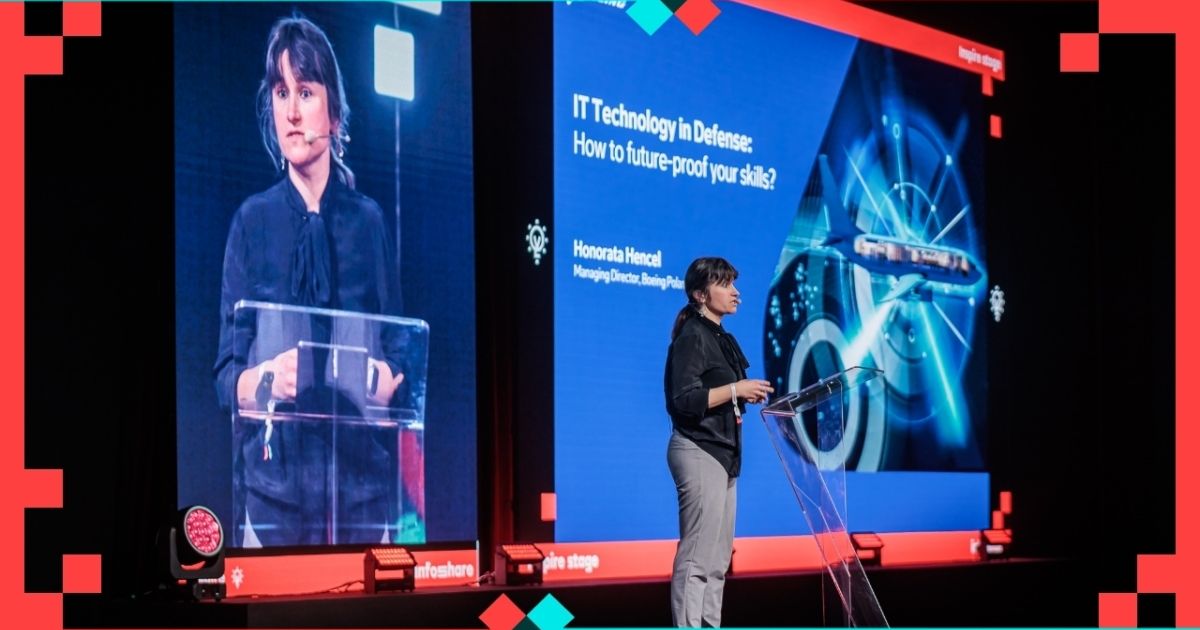VIEW SPEECH SUMMARY
- Defense requires integrated environments connecting military platforms for training, simulation, and mission planning.
- The sector is influenced by geopolitical threats and constrained environments, requiring adaptive skills.
- Emerging technologies include AI, autonomous vehicles (e.g., Boeing’s MQ-28 GhostBot), cybernetic weapons, data science, cryptography, and supply chain management.
- Cybersecurity is critical; Polish Ministry of Defense has a specialized cyber unit using AI and cryptography to protect infrastructure.
- Digital engineering and use of operational data (digital twins) are essential for product design, production, and testing.
- Simulation tools like Gladiator provide synthetic training environments integrating Navy, Air Force, and land forces.
- Maintenance and fleet support rely heavily on data science to predict lifespan and optimize logistics.
Skills & Industry Relevance:
- Defense sector demands both hard IT skills (software, systems integration, data science, AI) and soft skills (requirements analysis, agile thinking, customer service).
- Importance of understanding industry companies and forums in the national defense ecosystem.
- Workforce must be adaptable and prepared for evolving threats and technologies.
- Encouragement to consider defense sector roles even if currently working in civilian IT jobs.
- Highlight of opportunities such as hackathons, contests, and grants that focus on dual-use technologies (civilian and military).
- Emphasis on certifications and continuous learning in cyber and data domains.
Actionable Items / Tasks:
- Research and understand the defense industry and its companies, including Polish and international defense firms.
- Engage in industry forums, events, and InfoShare to network and learn about defense technology trends.
- Seek out hackathons, contests, and government grants related to defense and digital technologies.
- Acquire certifications in cybersecurity, data science, AI, and related fields relevant to defense.
- Explore opportunities to apply current IT skills in defense-related projects or organizations.
- Stay informed about geopolitical developments and how they influence defense technology needs.
- Develop adaptability and broaden skillsets to pivot from civilian IT to defense roles when needed.
Recommended Reading:
- "The Freedom's Forge" by Arthur Herman, about transforming industries during wartime—a relevant historical perspective on industrial adaptation.
Closing Message:
- Success in the defense sector depends on adaptability, understanding context, and leveraging IT skills to meet evolving defense challenges.
- Speaker is available for questions and encourages deeper exploration of defense as a promising career path for IT professionals.
IT Technology in the Defense Sector – how to future-proof your skills?
13:25 - 13:45, 27th of May (Tuesday) 2025 / INSPIRE STAGE
The presentation will discuss current trends related to the development of digital technologies in the defense sector and the skills needed to capture emerging opportunities in the defense business. Digital technologies applicable in the defense sector which will be discussed during presentation will include the use of autonomous systems, supply chain management and logistics, and support for crisis management and civil defense systems.
An example of such future competencies includes the creation of complex behavioral models of logistical and battlefield systems using, among other things, semantic modeling, which allows for linking data with their meaning (metadata). This approach, applied universally to a wide range of data of various types, will enable the discovery of new connections between data from distant, seemingly unrelated areas. This approach will significantly enhance the quality of predictions in areas such as threat identification (including asymmetric threats) in military and civilian applications.



